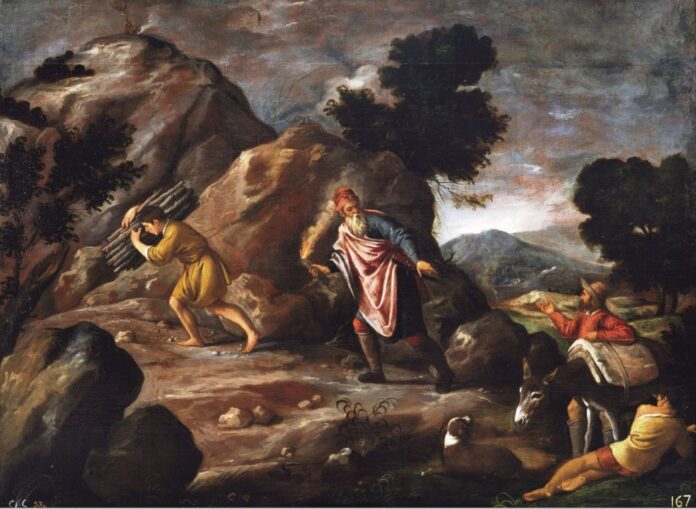Isaac stopped suddenly. For some time he had been climbing with a vague feeling of unease, as though something was not quite as it should be. Now it had come to him in a flash. Of course! They had forgotten to bring a lamb.
He and his father Abraham had set out three days ago, travelling north to some destination which had been kept from him. This morning they left the servants behind, and his father indicated that they were going to ascend a hill to offer a sacrifice. It was a routine they had followed many times at the altar in Beersheba, and although Isaac had never been to this place before, he cheerfully shouldered the sticks they would need to burn the offering when they got there. Walking with a load on his back made conversation difficult, and his father had kept up a good pace, in spite of his advancing years. In any case, the old man seemed to be wrapped up in his thoughts. So they mostly climbed in silence. Not until they were well on the way did it occur to Isaac what was wrong. They had brought the fuel, and his father had picked up the knife, and the fire was smouldering in its travelling pot, but by a strange lapse of memory, Abraham had come without an animal to sacrifice.
Isaac called, ‘My father!’ Abraham ans-wered, ‘Here I am, my son.’ Isaac said, ‘Behold, the fire and the wood, but where is the lamb for a burnt offering?’ Abraham’s reply was slow but firm: ‘God will provide for himself the lamb for a burnt offering, my son’ (Genesis 22:7–8). It was a strange answer, and Isaac had plenty of time to ponder it as they headed towards Mount Moriah.
What God Was This?
When we stop to look into the background to this incident, we are at first shocked, then deeply moved, and at last overwhelmed.
It all began four days before, at Beersheba. That evening the heavenly messenger had appeared to Abraham after a lapse of many years. He left him one clear, simple instruction: ‘Take your son, your only son Isaac, whom you love, and go to the land of Moriah, and offer him there as a burnt offering on one of the mountains of which I shall tell you’ (v. 2). Abraham was stunned. How could he kill his son, his only son, the child he and Sarah had waited for all those years? What God was this, to give him an heir, and then to snatch him away in such a monstrous way? Nor was that all. What of those promises that God had made about the great nation that was to descend from Isaac? How could they be fulfilled if Isaac was to be killed? We can imagine the confused and nightmarish night that Abraham passed, his soul torn between heartbreak, doubt and his reverence for God.
Let us make it plain before we go any further that the God of the Old Testament is not a cruel, barbarian deity demanding human sacrifice from His worshippers. God abhorred the child sacrifices of the Canaanites and the other nations round about. This is what He said to the Israelites in later years, when they had turned to human offerings in their depravity: ‘They have built the high places of Topheth, which is in the Valley of the Son of Hinnom, to burn their sons and their daughters in the fire, which I did not command, nor did it come into my mind’ (Jeremiah 7:31).
Why?
Why then did God ask Abraham to do this terrible thing? The first answer is that ‘God tested Abraham’ (Genesis 22:1). He was putting Abraham’s faith under tremendous pressure, to see if he would still stay loyal. How easy it would have been for Abraham to have shut his mind to the word of the Lord, or to have waited a few days to see whether God would change His mind. How many of us would give to God on request the most precious possession we have, without a fuss? In particular, how could we have reconciled the impossible conflict between God’s demand that we slay our child, when the promises He had made depended on that boy’s survival? Could we still trust a God like that?
To his eternal credit, Abraham showed his faith to be that strong. The record states that he rose early in the morning and saddled his donkey (v. 3). His solution to the problem of the promises was simple, but full of trust. This is how the writer to the Hebrews puts it:
By faith Abraham, when he was tested, offered up Isaac, and he who had received the promises was in the act of offering up his only son, of whom it was said, “Through Isaac shall your offspring be named.” He considered that God was able even to raise him from the dead, from which, figur-atively speaking, he did receive him back (Hebrews 11:17–19).
Abraham had decided that even if Isaac had to be put to death, God would be able to bring him to life again, and so ensure the fulfilment of the promises. What tremendous faith this man had!
Isaac Foreshadows Jesus
We have still not exhausted the depths behind God’s request. As we come to expect when we study the Bible, there is more to those incidents than meets the eye. The other reason why God asked Abraham to offer his son, was to teach us all a little more about what it would cost when God gave up the life of His dear son, the Lord Jesus Christ.
Do you notice the similarities between Isaac and the Lord Jesus? Both were born miraculously by the power of God. In Isaac’s case, God revived the fertility of Abraham and Sarah. For the birth of Jesus, God’s Spirit created life in the virgin Mary’s womb. Both men were dearly loved by their fathers. Both climbed a hill in order to die, and both carried the wood for their great sacrifice upon their backs.
In fact, we can at this point press the comparison further. For it transpires from the Genesis account that Isaac turned out a willing victim. He co-operated with his father in meeting the will of the Lord. When they reached the top of the hill, there was no lamb waiting there. As Abraham began to bind him hand and foot, Isaac would realise that he was the intended sacrifice. It would have been very easy for the strong young man to have struggled with his father and escaped to safety. The fact that he accepted and obeyed God’s requirements, even into the jaws of death, strengthens this wonderful allegory of the sacrifice of Christ.
What happened in the end? Did Isaac die? The drama heightens. Abraham laid Isaac on the altar, and actually reached the point of raising the knife to slay his son, when the voice of the angel came to him again: ‘Do not lay your hand on the boy or do anything to him, for now I know that you fear God, seeing you have not withheld your son, your only son, from me’
(Genesis 22:12). Abraham’s faith had stood the test, and he was spared the agony of watching Isaac die. Instead, he looked around and discovered there was a ram there all along, hidden behind him in a bush. He offered this to God instead of his son. But his prophetic words, ‘God will provide for himself the lamb’, would come true one day. Jesus was the Lamb and the Son, provided by God as a sacrifice for our sins (John 1:29).
Meaning For Us
What is there in this incident that has meaning for us? Firstly, we need to grapple with the fact that sometimes God will ask of His servants a sacrifice that hurts. Sometimes it is wealth or career or fame. It may be family or a friend. Sooner or later, and perhaps many times, they will have to choose between what they want to do themselves and obeying what they know to be the will of God.
The other lesson that speaks to our hearts, springs out of the pain that Abraham suffered as he faced the prospect of cutting off the life of his son. Every parent will understand the cost of the decision he had to make. Yet only thus, and still but dimly, do we reverently taste the depth of the love of God Himself, when He gave up His Son into the hands of cruel men to die. It was the only way to conquer sin —for a perfect man to suffer death, and to overcome with love the hatred of his enemies. But the consigning of His Son, His only Son, that He loved, to that fearful end, is a measure of the mercy of God to us all.
David Pearce
(to be continued)



